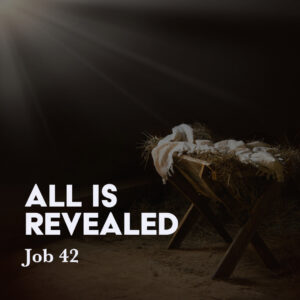Job 42: All Is Revealed
December 25, 2022
TODAY'S BIBLE READING:
John 21:15-25, Revelation 22, Job 42, Malachi 1-4

And so we come to the end of this astonishing Book of Job. In many ways, you could read the first couple of chapters or so, and then this last chapter, and not miss out on much of the message. Why then is the book so long? Why so repetitive? Part of the answer comes down to the psychology, the experiential side, of suffering. It is one thing to be told the answer; it is another to be persuaded of the answer. For the latter to take place we need more than simply a few words. We need a companion. A friend. We need time. We need to think it through, to process it. And these words of Scripture—sometimes by their very repetition—have been a companion to many on the hard road of personal suffering, or the confusing path of figuring out the intellectual answer to suffering and the problem of evil.
This chapter concludes that Job had it right all along. This is worth underlining. Job says some things about God that you could not get away with in Sunday School without it coming across as lacking piety. But God is clear: My servant Job has spoken the truth. God repeats it for emphasis in verses 8 and 9. Friend, if you find yourself sometimes questioning God, do not hide those thoughts in bitterness within but follow the example of Job and speak them to God. Ask him. Engage him directly. Speak to him about it. Use the privilege of your child relationship to your Heavenly Father and talk to him about your burdens and pains and difficulties. Even express to him your doubts.
What then is the answer to suffering? There are two parts that are described here regarding that.
The first is that there is a purpose to suffering. This is Job’s conclusion:
“I know that you can do all things; no purpose of yours can be thwarted” (42:2).
The apostle Paul answers the problem of human suffering in the same way:
“And we know that in all things God works for the good of those who love him, who have been called according to his purpose” (Romans 8:28).
That thought about purpose can be used cruelly in a counseling situation. Don’t you understand that there is a purpose to this? Why are you moaning about it? Remember, again, that Job did speak frankly to God his doubts. It is not wrong for you to do so. But at the same time, remember also what Job finally discovered. There is a purpose. We are not told that Job understands what that purpose was in his case! There is a lot of difference between trusting God that he has a good purpose for your suffering and knowing for sure what that purpose is.
There are things in my life that I do not understand why they have taken place. There are other things in my life that I can see more clearly God’s purpose. In either case, I can trust that God’s purpose is good because of the cross.
This is the second part to the answer to suffering that is pre-revealed (and fulfilled in the New Testament) in Job.
There must be a “sacrifice” (42:8), and Job must “pray” for his so-called “comforters” (42:8), and God will “accept” Job’s prayer on their behalf (42:8-9). The Old Testament sacrifices are fulfilled in the New Testament sacrifice; the lambs in the Old Testament are fulfilled in the Lamb of God who takes away the sin of the world. At this final moment, we see that Job, when we had thought over and over again that he was a type of us in our suffering, in a more profound and greater sense, is a type of Christ and his suffering for us. We are not so much Job as we are Job’s comforters. We are not righteously suffering like Job, but sinners needing a sacrifice in order to be accepted by God.
That too is part of the answer to suffering. That God in Christ, came as a baby, humbly, bore the shame and indignity of our humanity, lived and died as a sacrifice for our sins, that we might be accepted by God and restored to peace with him. Whenever you are struggling to understand suffering, take it to the cross. There, like a fixed mark in the history of the universe, is God’s counter-intuitive message that he does care, that he does love you, that he does want you—as he himself bore our sins in his body on the tree, that we might die to sins and live to righteousness and walk in faith and joy and hope as his disciples.
There is one more part of this last chapter, of course, too. And that is Job’s restoration. Such a grand restoration does not always happen in this life. But in the life to come it will.
“And I heard a loud voice from the throne saying, ‘Look! God’s dwelling-place is now among the people, and he will dwell with them. They will be his people, and God himself will be with them and be their God. He will wipe every tear from their eyes. There will be no more death’ or mourning or crying or pain, for the old order of things has passed away” (Revelation 21:3-4).
ABOUT THE AUTHOR
Josh Moody (Ph.D., University of Cambridge) is the senior pastor of College Church in Wheaton, IL., president and founder of God Centered Life Ministries, and author of several books including How the Bible Can Change Your Life and John 1-12 For You.
WANT MORE?
To receive God Centered Life devotionals directly in your inbox, as well as other resources, enter your email address in the form at the bottom of this page and click "subscribe."

